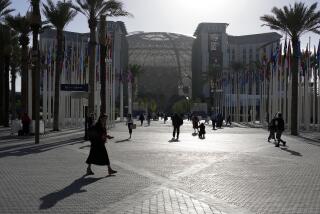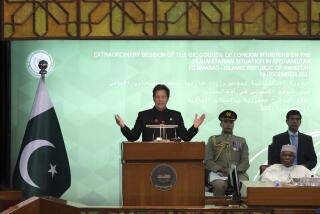Moderate Muslim Voices
The Organization of the Islamic Conference is not the most closely followed group among Americans. Yet it is the world’s largest international Muslim organization. It met in emergency session in Qatar this week. What it didn’t do was significant--and an important lesson in our nation’s sudden course of study on Islam and so much else this past month.
The conference did not condemn U.S. military actions against Afghanistan, a fellow Muslim country. The sometimes fractious 56 members unanimously, swiftly and implicitly backed a carefully targeted campaign against the extremist Afghan regime and expressed strong sympathy for terror attack victims.
To put this in context, imagine this group hailing Sept. 11 as a glorious victory, denouncing the allied response and justifying global Islamic resistance, all quite believable in the more apocalyptic circles in the United States.
Several important lessons here: Americans are often inclined to see foreign groups as monolithic us-versus-them; the Muslim world isn’t monolithic. The conference responded both to the universal threat that terrorism poses to social and governmental stability and to the Bush administration’s repeated assurances that terrorists are the target, not Islam.
The world’s emerging counterterrorism coalition remains fragile. Different countries and groups will support, remain silent or possibly peel off over different aspects of the expected long struggle. The conference’s words and attitude were pleasant surprises amid many shocks of a different sort. So far, so good.
More to Read
Sign up for Essential California
The most important California stories and recommendations in your inbox every morning.
You may occasionally receive promotional content from the Los Angeles Times.









